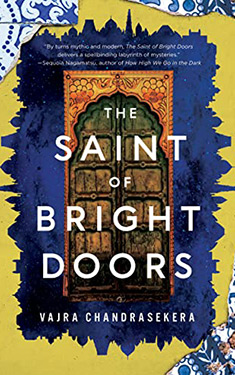Vajra Chandrasekera
Completed 5/11/2024, Reviewed 5/12/2024
4 stars
This book was very original in its mix of demons and anti-gods, brightly colored portals, and dystopian South Asia. I must admit, it is like nothing I’ve read before. At the same time, the strangeness of it made it difficult to stick to it. The prose, though, was phenomenal. It’s a very literary novel, with little back and forth dialogue and a ton of world building. I assume it’s set in a dystopian South Asia as the author is from Sri Lanka, there are tuk-tuks, there’s racism and castes, and saris are worn. But the location is never clearly defined. I can see why this book was nominated for a 2023 Nebula, but I thought it might be a little too prosy for a Hugo. However, it was nominated for a 2024 Hugo as well.
Fetter lives in Luriat. He goes to group therapy to deal with being the son of a messiah. He wants nothing better than to have a quiet life with his boyfriend Hej in the big city. All his life, his mother trained him to assassinate his father, but now, away from her influence, he’s trying to shed that part of himself. But the past is hard to release when your therapist is secretly a revolutionary, trying to bring you into the overthrow of the influence of Fetter’s father on the government. He did inherit some magic from his mother, like being able to see demons, feel cold winds from Luriat’s brightly painted doors that go to nowhere, and be impervious to fire. Oh yeah, and his mother tore off his shadow at birth so he sometimes passes by with little notice. But as much as he tries to avoid it, it looks like he’s on a collision course with his father and his henchmen.
I found the book difficult to dive into in the beginning. At first, I was in love with the prose, but then I became rather bored with it. It was tough getting to like Fetter, who seemed aimless and kept too much to himself. So it took a long time to decide whether I liked him or not. The best part of him was that other people really like him, like his boyfriend Hej, his therapist, and Caduv who connected with Fetter when Caduv first came to Luriat. But as the plot unfolded, it became easy to see why Fetter was not very likeable by the reader. He didn’t like who he was supposed to be. And trying to shed that persona and finding who he wants to be made it difficult to empathize with him.
It took me nearly two weeks to read this book, which was only about 350 pages. I went for days only reading two pages at a time, partly because I had many late evening meetings with a work team in India. And that’s too bad because I lost some of the world building during that period, causing me to be a little lost at times. However, I read the last 200 pages in two days, and it did come to a good climax. I was able to recall everything I needed for the ending to make sense.
One thing I really did like was finding out who the narrator was. It happens at the end, so I’m not going to spoil it. But it did surprise me.
Reflecting on the book for a day, I give it four stars out of five. It really is a good book. It was nice to read a book with LGBTQ+ characters after a long hiatus from the subgenre. I just found it hard to stay with it. It might have a good chance at winning the Nebula, which is a peer award, and the Nebulas often reward prosy work. But I don’t know about the Hugo. I have to read the others to see what I think fans would reward. Chandrasekera has written a lot of short works and I would really be interested in reading some of those stories. This is his first novel.

No comments:
Post a Comment